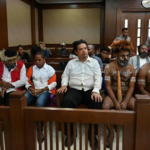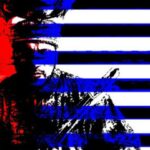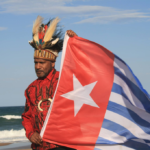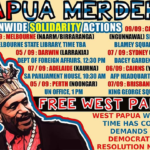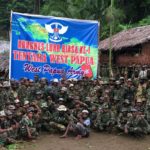West Papua’s “Mandela” Filep Karma Dies Under Mysterious Circumstances
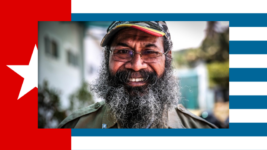
Fierce West Papuan resistance figure, Filep Karma, was found dead on Jayapura Beach on 1 November under suspicious circumstances.
The experienced diver supposedly drowned whilst surfing. He was with four Indonesians at the time, and no investigation is likely to be forthcoming.
Karma was the longest serving peace activist in an Indonesian gaol. He continued to take a frontline position in all key protests against Jakarta’s rule. And he led the 1998 Morning Star flag protest in Biak, which the Indonesian government cracked down on to the point of killing 200 civilians.
“For West Papuans, Filep was equivalent to Mahatma Gandhi, Nelson Mandela, Martin Luther King. The history of our struggle lived within him,” said United Liberation Movement for West Papua (ULMWP) provisional government interim president Benny Wenda in a 1 November statement.
“Filep stood for justice, democracy, for peace and non-violent resistance. Despite this, he was jailed for 11 years for raising the Morning Star flag,” Wenda added. “We can see how Indonesia treats peacemakers. Even now, they cannot even let us grieve in peace.”
Wenda was referring to heavily armed police blocking protesters marching in honour of Karma, as well as approaching some of those involved who were holding Morning Star flags – the key symbol of West Papuan statehood and resistance to 59 years of colonial rule – and snatching them.
Divide and rule
Having taken control of the nation of West Papua in 1963, after former coloniser the Netherlands pulled out, Jakarta split the country into two Indonesian provinces – West Papua and Papua – in 2003, using an old colonising tactic to cause divisions within local populations.
But in a sign that recent developments coming from the West Papuan resistance are making Jakarta a little less sure of the grip it, as a Southeast Asian country, has over the Melanesian people of the island nation, the Indonesian government has now further carved up the region.
Indonesia’s parliament passed legislation on 30 June to facilitate the inclusion of three more Indonesian provinces created out of the two it had already divided the Melanesian country into. The additional provinces are now known as South Papua, Central Papua and Highland Papua.
The Joko Widodo government also passed multiple amendments to the 2001 Papuan Special Autonomy Law in June last year, which Jakarta claims is all about economically empowering the people living in the poorest region under Indonesia’s jurisdiction.
ULMWP’s Markus Haluk told Reuters at the time that the laws were yet another attempt by Jakarta to consolidate its colonial rule over the region, and if the Indonesian government was serious about West Papuan autonomy, a national vote would be put to the people on who rules.
A real vote on self-determination
This year marks 59 years since Indonesia was handed control of the Melanesian nation by the UN, which, due to the 1962 New York agreement, administered West Papua for a year prior to relinquishing control to Jakarta on the proviso that it gave West Papuans a vote on independence.
However, a travesty ensued. In 1969, the UN-brokered Act of Free Choice was held in West Papua. Jakarta handpicked 1,026 West Papuans to represent the entire Indigenous population, and through threat of violence, ensured that all the voters chose to remain with their oppressors.
But despite a real national vote being denied, the West Papuans have maintained their struggle for independence for close to six decades now, in the face of extreme oppressions, and this has taken place via peaceful demonstrations or in the form of armed resistance.
And the last few years have seen West Papuan resistance escalate. In 2017, a clandestine petition calling for a new vote be held to determine whether West Papuans want self-determination restored saw 1.8 million Indigenous locals – or 70 percent of the population – risk their lives to sign it.
Then in early 2019, Wenda presented the petition to the UN Human Rights High Commissioner, calling for the new referendum on West Papua becoming an independent nation to be held under internationally supervised guidelines.
Ready in waiting
Wenda announced on 1 May last year, that the ULMWP has covertly established the West Papuan provisional government, complete with appointed ministers, a cabinet and twelve government departments, right inside Indonesian occupied West Papua.
The clandestine government was announced on the 58th anniversary of Jakarta’s ruthless takeover of the resource rich region. At the time, Wenda underscored that his nation is the only one that contains a department of environment and green state policy.
Of course, as interim president, Wenda will conduct his role from outside of his own country, as he fled political imprisonment in West Papua in 2002, and has since lived in exile in the UK, where he was granted asylum.
This development occurred two years after the three main West Papuan armed resistance factions signed the 1 May 2019 Vanimo Border Declaration, which marked the consolidation of the West Papua Army, which, as of last year, has ULMWP political oversight.
Another agitator dies unexplained
“It is more common for West Papuans to die in mysterious ways after speaking out against Indonesian colonialism,” Wenda said on the day that Karma died. “Sixteen Papuan leaders, many of them in their 40s and 50s, have died in suspicious circumstances since 2020.”
The West Papuan interim president maintained that it would be unlikely the true reasons behind the death will ever be known, as, even when the Indonesians carry out an autopsy into such a death, the results are never publicly released.
Wenda further added that over the last few years Karma had been a particularly vocal opponent against the further partitioning of the country into five provinces, as well as the special autonomy laws, which are supposed to boost funding into the region to the benefit of West Papuans.
“For me, as for all West Papuans, Filep’s struggle continues. His legacy and his dream of freedom lives on in the next generation, who suffer the same systematic discrimination and fight for the same goal,” Wenda concluded his statement.
“I call on all West Papuans, wherever you are, to keep strong in Filep’s memory, and unite behind the ULMWP provisional government.”



